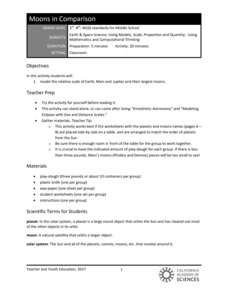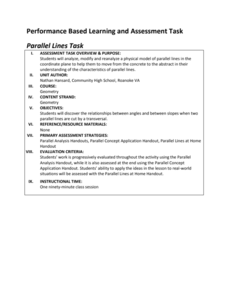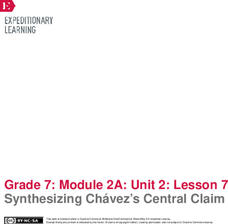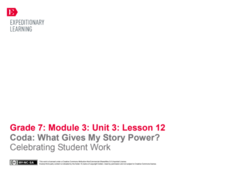Hawaiʻi State Department of Education
Symmetrical Objects
In order to better understand how to locate a plane of symmetry in 3-dimensional objects, learners create a dance. The class reviews dance and math symmetry, then they practice making symmetrical shapes and movements with a partner. They...
NOAA
Individual Species in the Deep Sea
A tube worm's outer covering is made of chitin, the same material that makes up the shells of lobsters and crabs. Scholars create tube worms and analyze and discuss the longevity of organisms living near cold seeps. They then discuss and...
American Chemical Society
What is a Chemical Reaction?
When a candle burns down, what happens to the mass that appears to be shrinking? Lesson begins with a demonstration of the chemical reaction of a candle burning. Then scholars use atom models to observe conservation of mass concretely.
Virginia Department of Education
Matching Representations
Pupils explore the many representations of linear functions by completing a matching activity to connect the multiple representations of a function. They then reinforce the connection as individuals create the different representations...
EngageNY
Positive and Negative Numbers on the Number Line—Opposite Direction and Value
Make your own number line ... using a compass. The first installment of a 21-part series has scholars investigate positive and negative integers on a number line by using a compass to construct points that are the same distance from zero...
Columbus City Schools
Making Waves
Learning about waves can have its ups and downs, but a demo-packed tool kit has the class "standing" for more! Learners gain experience with several different wave types, organizing observations and data, and wave terminology. The...
University of Minnesota
Connect the Neurons!
Create a neuron frenzy as your pupils play the part of the neurons. An engaging lesson creates a human chain of neurons that pass cotton balls posing as neurotransmitters. Scholars learn about pre- and post-synapses as they complete the...
CK-12 Foundation
Operations with Sets: Let's Roll the Dice!
There's no need to roll dice for this probability experiment, the resource includes them already. Scholars use an interactive to see how including more possibilities as favorable outcomes in a dice activity affects the probabilities....
CK-12 Foundation
Fundamental Counting Principle with and without Repetition: Outfit Combinations
But I have nothing to wear! Using an interactive, individuals create all possible outfits from three shirts, one belt, and two pairs of pants. Answering a set of challenge questions helps them see what they have learned from the experience.
CK-12 Foundation
Permutations and Combinations Compared: Colored Candies
Here's a sweet resource on sample spaces. An enticing interactive allows users to list all possibilities for the flavors of candy given to a friend. Scholars must also determine whether permutations or combinations are more appropriate...
CK-12 Foundation
Polygon Classification
Polly want a polygon? Young mathematicians sort shapes using an interactive. They classify the shapes as convex polygons, concave polygons, or not polygons.
Smithsonian Institution
War of 1812
Luckily for those who aren't history buffs, anyone can guess that the War of 1812 happened in ... 1812. But how to cover the rest of the story? The resource does just that with effective direct instruction that includes statistics,...
WE Charity
Elementary–Module 3: Food Waste
Before pupils discard anymore of their uneaten vegetables, they may want to learn more about food waste. Here's a resource to help them do just that! Using discussion and video, scholars discover how innovators are tackling the issue. As...
ProCon
Minimum Wage
The first ever minimum wage in America was set at 25 cents per hour in 1938 and has been steadily, if slowly, increasing ever since. Using the provided website, pupils decide if the United States should further increase the federal...
California Academy of Science
Moons in Comparison
Just how big is Earth's moon? With a hands-on simulation, scholars use Play-Doh to model the sizes of the planets Earth, Mars, Jupiter, and their moons. They make predictions as a class, work together to make their models, and discuss...
EngageNY
Analyzing Character and Theme: Tracking Control in A Midsummer Night’s Dream
Scholars examine how characters try to control one another in Shakespeare's A Midsummer Night's Dream. They engage in a read-aloud and class discussion to iron out ideas. They also work in small groups to complete a note-catcher...
EngageNY
Analyzing the Resolution of the Play: World Café Discussion
It's time to get active! Scholars participate in a World Café protocol to promote discussion and leadership. They leave their seats and move from group to group to discuss critical questions related to their read-aloud of Shakespeare's A...
Purdue University
Chirp! Chirp!
If you build it, they will come. Young scholars learn about local birds in an interesting hands-on instructional activity. They begin by identifying birds either from photos or in nature and then build their own bird feeders. The...
Radford University
Parallel Lines Task
Transform the classroom into a coordinate plane. Scholars walk along parallel lines drawn on a coordinate plane on the classroom floor. They measure angles and slopes and use the results to develop criteria that would make the lines...
EngageNY
Final Performance Task: Sharing Visual Representations of Position Papers
It's time to put down those pencils and celebrate! Scholars share the visual representations of their position papers with the class. They participate in a gallery walk to view each other's work, writing a piece of praise for their...
EngageNY
Synthesizing Chávez’s Central Claim
Class members play an interactive game, matching strips of paper containing rhetorical devices with examples from César Chávez use rhetoric in his 1984 speech, "Address to the Commonwealth Club of California." Next, partners discuss...
EngageNY
Coda: What Gives My Story Power? Celebrating Student Work
It's time for a celebration! Scholars go on a gallery walk around the classroom to view their peers' completed illustrated children's stories. Using sticky notes, pupils provide feedback about the powerful elements they find in their...
EngageNY
Identifying Main Ideas and Supporting Details: What’s Going On in the Teenage Brain?
What's going on in the teen brain? Pupils consider the question as they continue reading an informational article about the topic. While reading, they use a Thinking Log worksheet and an anchor chart to track their understanding of...
EngageNY
Forming a Research-Based Claim: Analyzing Risks and Benefits for Stakeholder
Welcome to the World Café, where lively debate is on the menu! Scholars participate in the World Café protocol, moving between discussion groups to decide if the American Academy of Pediatrics should increase its adolescent screen time...
Other popular searches
- Kinesthetic Learner Math
- Literacy Kinesthetic Learner
- Kinesthetic Learner English
- Kinesthetic Learner Reading
- Kinesthetic Learner History
- Kinesthetic Learner Algebra
- Kinesthetic Learner Health
- Kinesthetic Learner French
- Kinesthetic Learner + Math
- Kinesthetic Learner Math Time

























